Critical Appraisal: Tea/Coffee Consumption & Cancer Risk Study
VerifiedAdded on 2023/06/03
|11
|3463
|422
Report
AI Summary
This report presents a critical appraisal of a research article investigating the association between coffee and tea consumption and the risk of endometrial cancer. The appraisal includes an overview of the journal, an assessment of the internal validity of the findings, an evaluation of the causality inference, and a discussion of the study's limitations. The original study, conducted at Roswell Park Cancer Institute, analyzed data collected from 1982 to 1998, examining the dietary habits of women with and without endometrial cancer. While the study suggests a potential inverse relationship between coffee and tea consumption and endometrial cancer risk, the appraisal highlights issues with statistical significance and contradictory findings compared to other research in the field. The report concludes that the study's findings are suggestive but not conclusive, and that further research is needed to establish a definitive link between coffee and tea consumption and endometrial cancer risk. Desklib provides access to this report and other solved assignments for students.
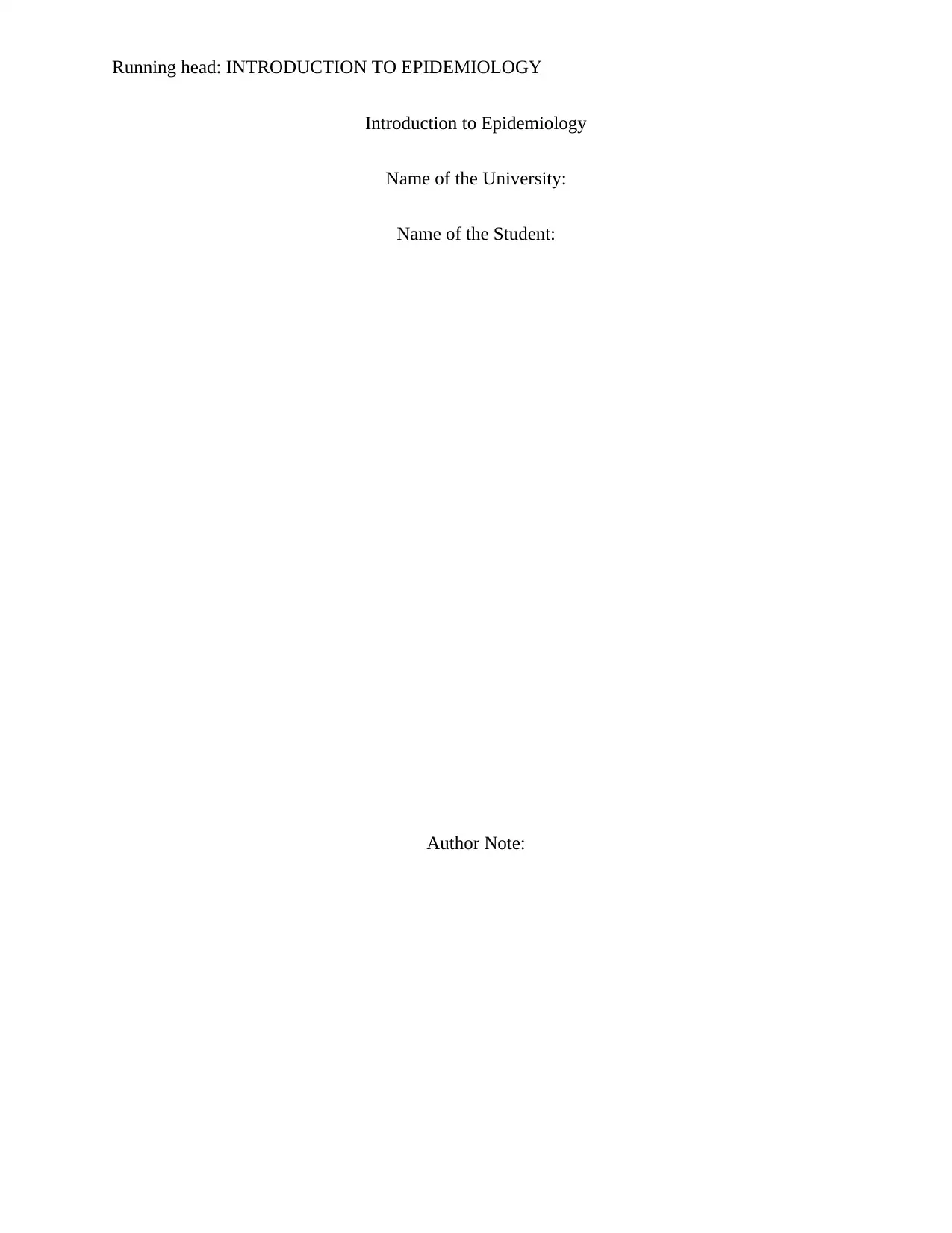
Running head: INTRODUCTION TO EPIDEMIOLOGY
Introduction to Epidemiology
Name of the University:
Name of the Student:
Author Note:
Introduction to Epidemiology
Name of the University:
Name of the Student:
Author Note:
Paraphrase This Document
Need a fresh take? Get an instant paraphrase of this document with our AI Paraphraser
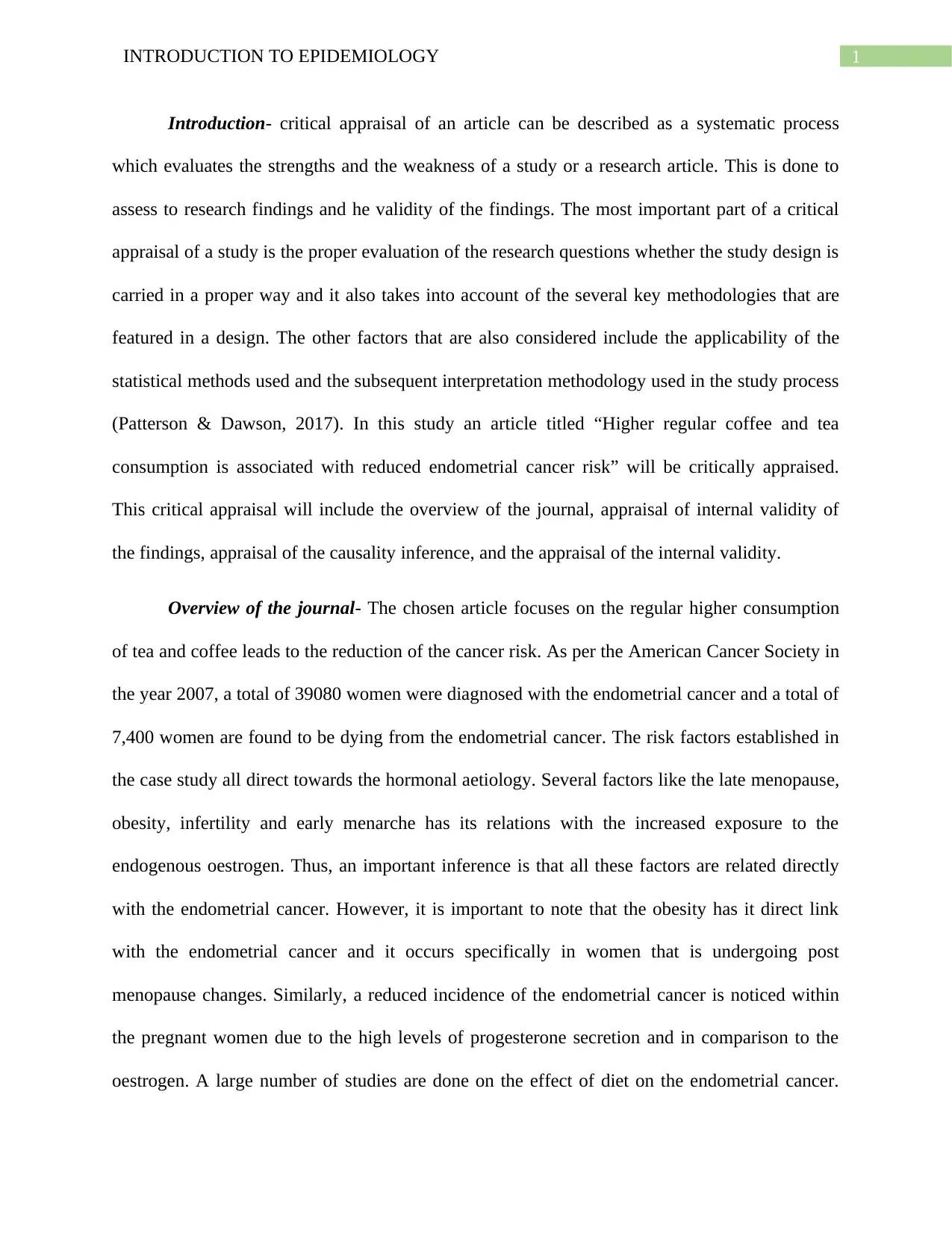
1INTRODUCTION TO EPIDEMIOLOGY
Introduction- critical appraisal of an article can be described as a systematic process
which evaluates the strengths and the weakness of a study or a research article. This is done to
assess to research findings and he validity of the findings. The most important part of a critical
appraisal of a study is the proper evaluation of the research questions whether the study design is
carried in a proper way and it also takes into account of the several key methodologies that are
featured in a design. The other factors that are also considered include the applicability of the
statistical methods used and the subsequent interpretation methodology used in the study process
(Patterson & Dawson, 2017). In this study an article titled “Higher regular coffee and tea
consumption is associated with reduced endometrial cancer risk” will be critically appraised.
This critical appraisal will include the overview of the journal, appraisal of internal validity of
the findings, appraisal of the causality inference, and the appraisal of the internal validity.
Overview of the journal- The chosen article focuses on the regular higher consumption
of tea and coffee leads to the reduction of the cancer risk. As per the American Cancer Society in
the year 2007, a total of 39080 women were diagnosed with the endometrial cancer and a total of
7,400 women are found to be dying from the endometrial cancer. The risk factors established in
the case study all direct towards the hormonal aetiology. Several factors like the late menopause,
obesity, infertility and early menarche has its relations with the increased exposure to the
endogenous oestrogen. Thus, an important inference is that all these factors are related directly
with the endometrial cancer. However, it is important to note that the obesity has it direct link
with the endometrial cancer and it occurs specifically in women that is undergoing post
menopause changes. Similarly, a reduced incidence of the endometrial cancer is noticed within
the pregnant women due to the high levels of progesterone secretion and in comparison to the
oestrogen. A large number of studies are done on the effect of diet on the endometrial cancer.
Introduction- critical appraisal of an article can be described as a systematic process
which evaluates the strengths and the weakness of a study or a research article. This is done to
assess to research findings and he validity of the findings. The most important part of a critical
appraisal of a study is the proper evaluation of the research questions whether the study design is
carried in a proper way and it also takes into account of the several key methodologies that are
featured in a design. The other factors that are also considered include the applicability of the
statistical methods used and the subsequent interpretation methodology used in the study process
(Patterson & Dawson, 2017). In this study an article titled “Higher regular coffee and tea
consumption is associated with reduced endometrial cancer risk” will be critically appraised.
This critical appraisal will include the overview of the journal, appraisal of internal validity of
the findings, appraisal of the causality inference, and the appraisal of the internal validity.
Overview of the journal- The chosen article focuses on the regular higher consumption
of tea and coffee leads to the reduction of the cancer risk. As per the American Cancer Society in
the year 2007, a total of 39080 women were diagnosed with the endometrial cancer and a total of
7,400 women are found to be dying from the endometrial cancer. The risk factors established in
the case study all direct towards the hormonal aetiology. Several factors like the late menopause,
obesity, infertility and early menarche has its relations with the increased exposure to the
endogenous oestrogen. Thus, an important inference is that all these factors are related directly
with the endometrial cancer. However, it is important to note that the obesity has it direct link
with the endometrial cancer and it occurs specifically in women that is undergoing post
menopause changes. Similarly, a reduced incidence of the endometrial cancer is noticed within
the pregnant women due to the high levels of progesterone secretion and in comparison to the
oestrogen. A large number of studies are done on the effect of diet on the endometrial cancer.
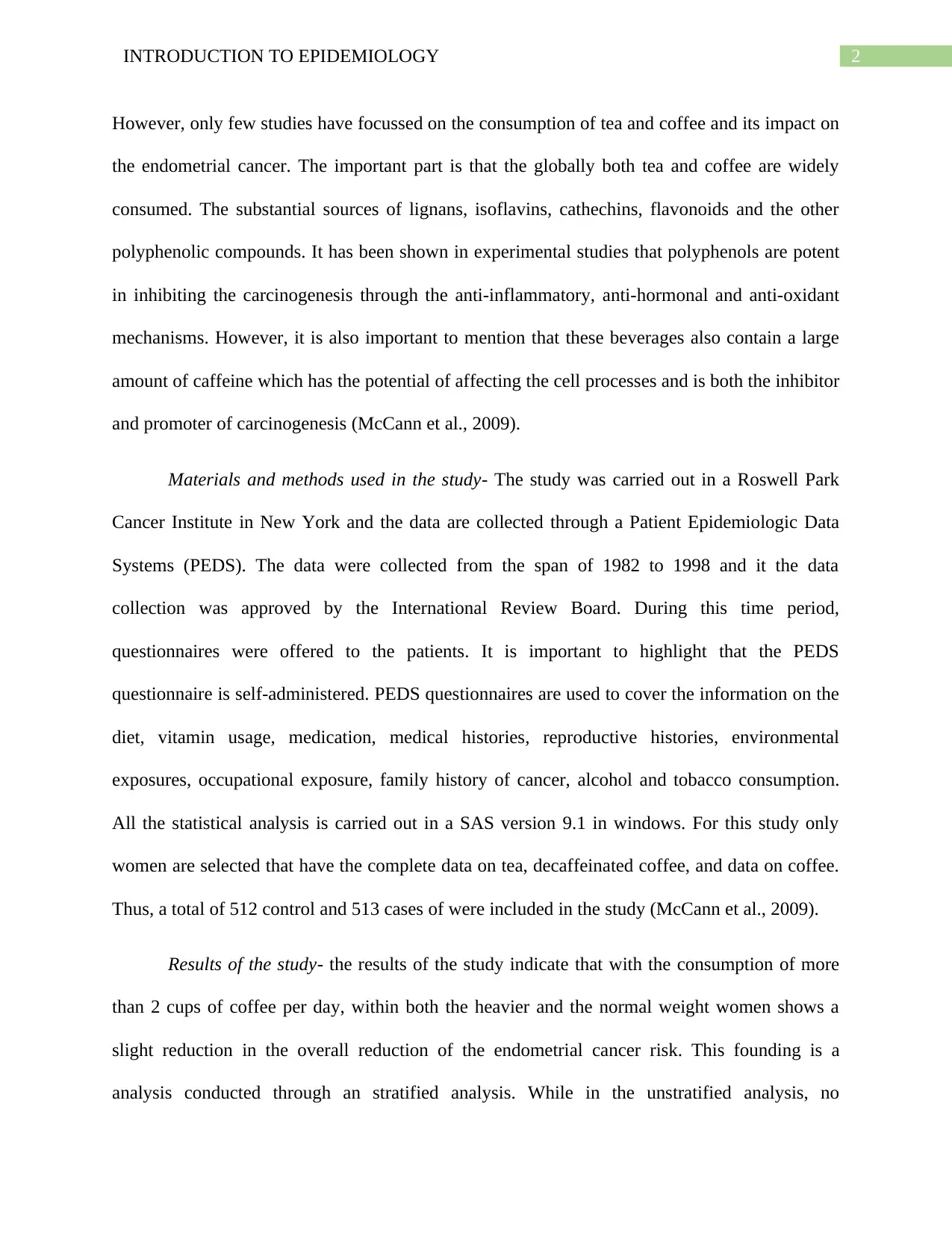
2INTRODUCTION TO EPIDEMIOLOGY
However, only few studies have focussed on the consumption of tea and coffee and its impact on
the endometrial cancer. The important part is that the globally both tea and coffee are widely
consumed. The substantial sources of lignans, isoflavins, cathechins, flavonoids and the other
polyphenolic compounds. It has been shown in experimental studies that polyphenols are potent
in inhibiting the carcinogenesis through the anti-inflammatory, anti-hormonal and anti-oxidant
mechanisms. However, it is also important to mention that these beverages also contain a large
amount of caffeine which has the potential of affecting the cell processes and is both the inhibitor
and promoter of carcinogenesis (McCann et al., 2009).
Materials and methods used in the study- The study was carried out in a Roswell Park
Cancer Institute in New York and the data are collected through a Patient Epidemiologic Data
Systems (PEDS). The data were collected from the span of 1982 to 1998 and it the data
collection was approved by the International Review Board. During this time period,
questionnaires were offered to the patients. It is important to highlight that the PEDS
questionnaire is self-administered. PEDS questionnaires are used to cover the information on the
diet, vitamin usage, medication, medical histories, reproductive histories, environmental
exposures, occupational exposure, family history of cancer, alcohol and tobacco consumption.
All the statistical analysis is carried out in a SAS version 9.1 in windows. For this study only
women are selected that have the complete data on tea, decaffeinated coffee, and data on coffee.
Thus, a total of 512 control and 513 cases of were included in the study (McCann et al., 2009).
Results of the study- the results of the study indicate that with the consumption of more
than 2 cups of coffee per day, within both the heavier and the normal weight women shows a
slight reduction in the overall reduction of the endometrial cancer risk. This founding is a
analysis conducted through an stratified analysis. While in the unstratified analysis, no
However, only few studies have focussed on the consumption of tea and coffee and its impact on
the endometrial cancer. The important part is that the globally both tea and coffee are widely
consumed. The substantial sources of lignans, isoflavins, cathechins, flavonoids and the other
polyphenolic compounds. It has been shown in experimental studies that polyphenols are potent
in inhibiting the carcinogenesis through the anti-inflammatory, anti-hormonal and anti-oxidant
mechanisms. However, it is also important to mention that these beverages also contain a large
amount of caffeine which has the potential of affecting the cell processes and is both the inhibitor
and promoter of carcinogenesis (McCann et al., 2009).
Materials and methods used in the study- The study was carried out in a Roswell Park
Cancer Institute in New York and the data are collected through a Patient Epidemiologic Data
Systems (PEDS). The data were collected from the span of 1982 to 1998 and it the data
collection was approved by the International Review Board. During this time period,
questionnaires were offered to the patients. It is important to highlight that the PEDS
questionnaire is self-administered. PEDS questionnaires are used to cover the information on the
diet, vitamin usage, medication, medical histories, reproductive histories, environmental
exposures, occupational exposure, family history of cancer, alcohol and tobacco consumption.
All the statistical analysis is carried out in a SAS version 9.1 in windows. For this study only
women are selected that have the complete data on tea, decaffeinated coffee, and data on coffee.
Thus, a total of 512 control and 513 cases of were included in the study (McCann et al., 2009).
Results of the study- the results of the study indicate that with the consumption of more
than 2 cups of coffee per day, within both the heavier and the normal weight women shows a
slight reduction in the overall reduction of the endometrial cancer risk. This founding is a
analysis conducted through an stratified analysis. While in the unstratified analysis, no
⊘ This is a preview!⊘
Do you want full access?
Subscribe today to unlock all pages.

Trusted by 1+ million students worldwide
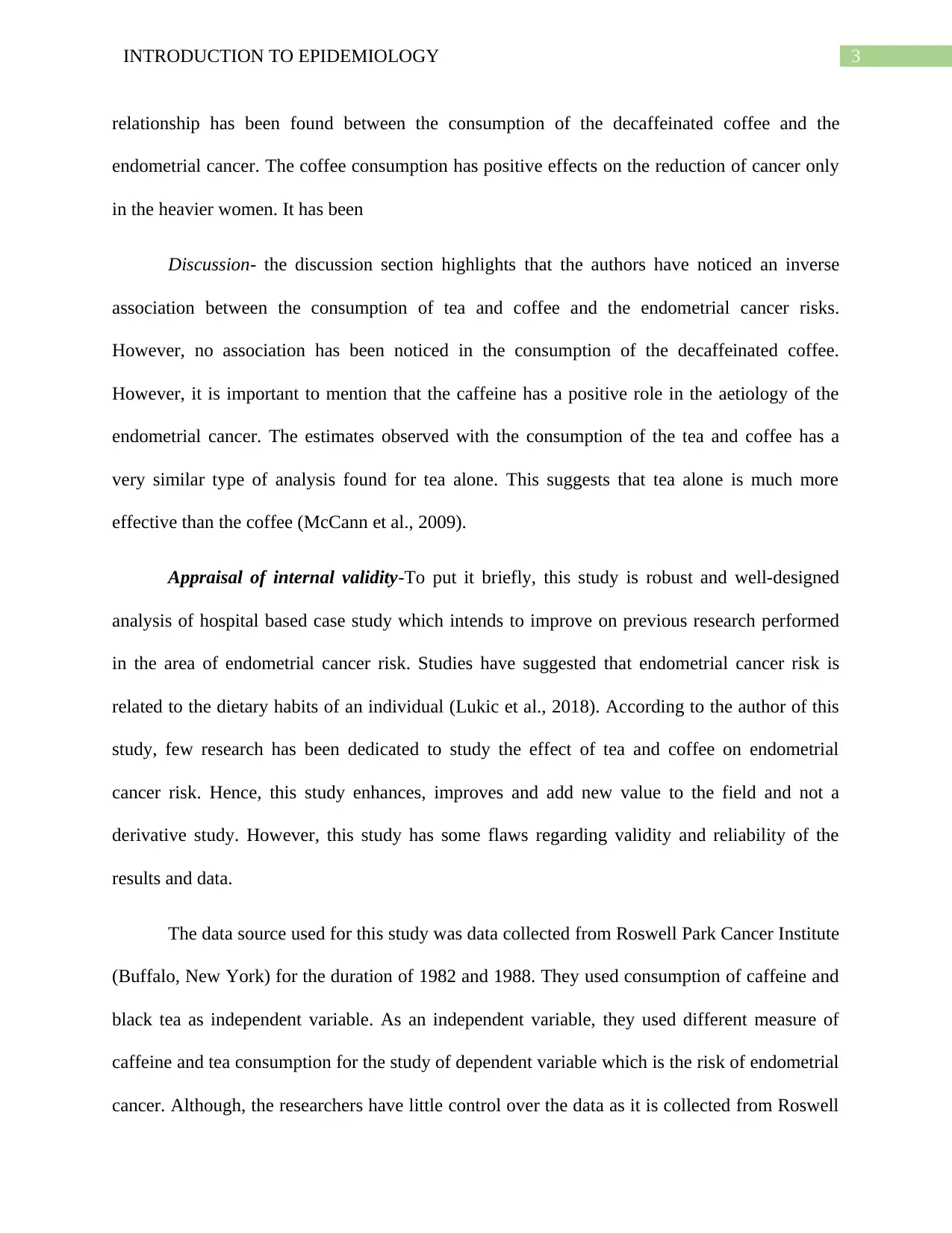
3INTRODUCTION TO EPIDEMIOLOGY
relationship has been found between the consumption of the decaffeinated coffee and the
endometrial cancer. The coffee consumption has positive effects on the reduction of cancer only
in the heavier women. It has been
Discussion- the discussion section highlights that the authors have noticed an inverse
association between the consumption of tea and coffee and the endometrial cancer risks.
However, no association has been noticed in the consumption of the decaffeinated coffee.
However, it is important to mention that the caffeine has a positive role in the aetiology of the
endometrial cancer. The estimates observed with the consumption of the tea and coffee has a
very similar type of analysis found for tea alone. This suggests that tea alone is much more
effective than the coffee (McCann et al., 2009).
Appraisal of internal validity-To put it briefly, this study is robust and well-designed
analysis of hospital based case study which intends to improve on previous research performed
in the area of endometrial cancer risk. Studies have suggested that endometrial cancer risk is
related to the dietary habits of an individual (Lukic et al., 2018). According to the author of this
study, few research has been dedicated to study the effect of tea and coffee on endometrial
cancer risk. Hence, this study enhances, improves and add new value to the field and not a
derivative study. However, this study has some flaws regarding validity and reliability of the
results and data.
The data source used for this study was data collected from Roswell Park Cancer Institute
(Buffalo, New York) for the duration of 1982 and 1988. They used consumption of caffeine and
black tea as independent variable. As an independent variable, they used different measure of
caffeine and tea consumption for the study of dependent variable which is the risk of endometrial
cancer. Although, the researchers have little control over the data as it is collected from Roswell
relationship has been found between the consumption of the decaffeinated coffee and the
endometrial cancer. The coffee consumption has positive effects on the reduction of cancer only
in the heavier women. It has been
Discussion- the discussion section highlights that the authors have noticed an inverse
association between the consumption of tea and coffee and the endometrial cancer risks.
However, no association has been noticed in the consumption of the decaffeinated coffee.
However, it is important to mention that the caffeine has a positive role in the aetiology of the
endometrial cancer. The estimates observed with the consumption of the tea and coffee has a
very similar type of analysis found for tea alone. This suggests that tea alone is much more
effective than the coffee (McCann et al., 2009).
Appraisal of internal validity-To put it briefly, this study is robust and well-designed
analysis of hospital based case study which intends to improve on previous research performed
in the area of endometrial cancer risk. Studies have suggested that endometrial cancer risk is
related to the dietary habits of an individual (Lukic et al., 2018). According to the author of this
study, few research has been dedicated to study the effect of tea and coffee on endometrial
cancer risk. Hence, this study enhances, improves and add new value to the field and not a
derivative study. However, this study has some flaws regarding validity and reliability of the
results and data.
The data source used for this study was data collected from Roswell Park Cancer Institute
(Buffalo, New York) for the duration of 1982 and 1988. They used consumption of caffeine and
black tea as independent variable. As an independent variable, they used different measure of
caffeine and tea consumption for the study of dependent variable which is the risk of endometrial
cancer. Although, the researchers have little control over the data as it is collected from Roswell
Paraphrase This Document
Need a fresh take? Get an instant paraphrase of this document with our AI Paraphraser
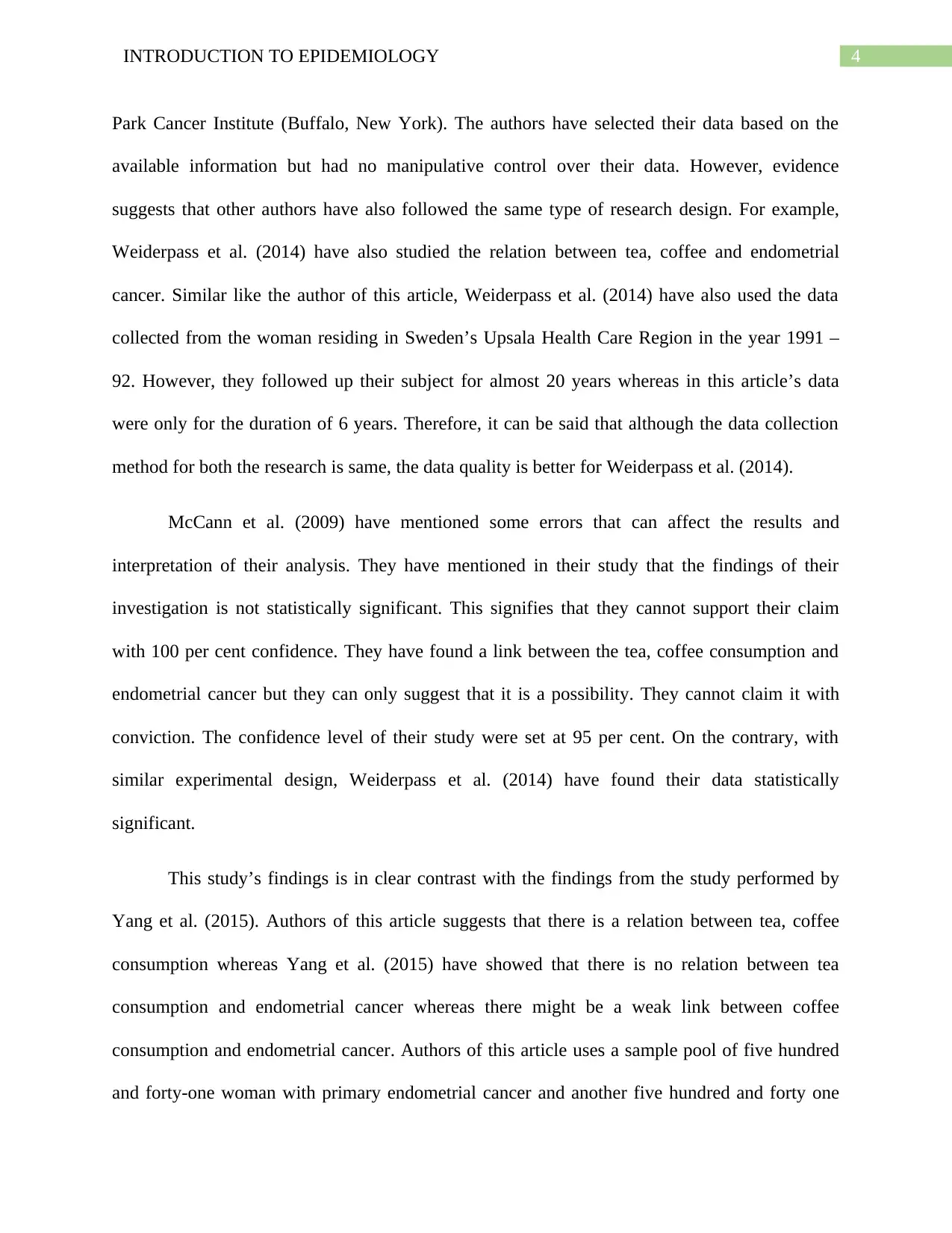
4INTRODUCTION TO EPIDEMIOLOGY
Park Cancer Institute (Buffalo, New York). The authors have selected their data based on the
available information but had no manipulative control over their data. However, evidence
suggests that other authors have also followed the same type of research design. For example,
Weiderpass et al. (2014) have also studied the relation between tea, coffee and endometrial
cancer. Similar like the author of this article, Weiderpass et al. (2014) have also used the data
collected from the woman residing in Sweden’s Upsala Health Care Region in the year 1991 –
92. However, they followed up their subject for almost 20 years whereas in this article’s data
were only for the duration of 6 years. Therefore, it can be said that although the data collection
method for both the research is same, the data quality is better for Weiderpass et al. (2014).
McCann et al. (2009) have mentioned some errors that can affect the results and
interpretation of their analysis. They have mentioned in their study that the findings of their
investigation is not statistically significant. This signifies that they cannot support their claim
with 100 per cent confidence. They have found a link between the tea, coffee consumption and
endometrial cancer but they can only suggest that it is a possibility. They cannot claim it with
conviction. The confidence level of their study were set at 95 per cent. On the contrary, with
similar experimental design, Weiderpass et al. (2014) have found their data statistically
significant.
This study’s findings is in clear contrast with the findings from the study performed by
Yang et al. (2015). Authors of this article suggests that there is a relation between tea, coffee
consumption whereas Yang et al. (2015) have showed that there is no relation between tea
consumption and endometrial cancer whereas there might be a weak link between coffee
consumption and endometrial cancer. Authors of this article uses a sample pool of five hundred
and forty-one woman with primary endometrial cancer and another five hundred and forty one
Park Cancer Institute (Buffalo, New York). The authors have selected their data based on the
available information but had no manipulative control over their data. However, evidence
suggests that other authors have also followed the same type of research design. For example,
Weiderpass et al. (2014) have also studied the relation between tea, coffee and endometrial
cancer. Similar like the author of this article, Weiderpass et al. (2014) have also used the data
collected from the woman residing in Sweden’s Upsala Health Care Region in the year 1991 –
92. However, they followed up their subject for almost 20 years whereas in this article’s data
were only for the duration of 6 years. Therefore, it can be said that although the data collection
method for both the research is same, the data quality is better for Weiderpass et al. (2014).
McCann et al. (2009) have mentioned some errors that can affect the results and
interpretation of their analysis. They have mentioned in their study that the findings of their
investigation is not statistically significant. This signifies that they cannot support their claim
with 100 per cent confidence. They have found a link between the tea, coffee consumption and
endometrial cancer but they can only suggest that it is a possibility. They cannot claim it with
conviction. The confidence level of their study were set at 95 per cent. On the contrary, with
similar experimental design, Weiderpass et al. (2014) have found their data statistically
significant.
This study’s findings is in clear contrast with the findings from the study performed by
Yang et al. (2015). Authors of this article suggests that there is a relation between tea, coffee
consumption whereas Yang et al. (2015) have showed that there is no relation between tea
consumption and endometrial cancer whereas there might be a weak link between coffee
consumption and endometrial cancer. Authors of this article uses a sample pool of five hundred
and forty-one woman with primary endometrial cancer and another five hundred and forty one
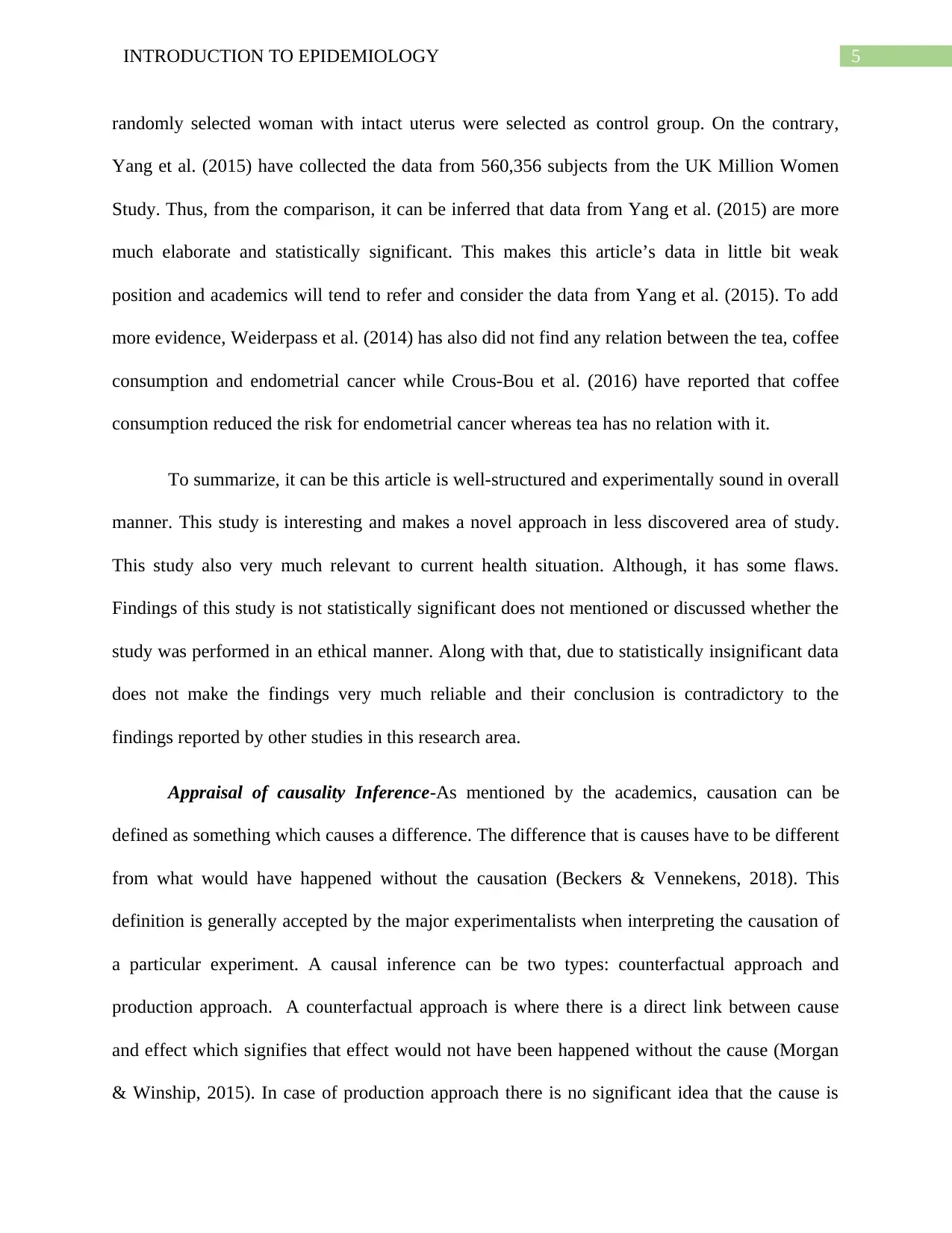
5INTRODUCTION TO EPIDEMIOLOGY
randomly selected woman with intact uterus were selected as control group. On the contrary,
Yang et al. (2015) have collected the data from 560,356 subjects from the UK Million Women
Study. Thus, from the comparison, it can be inferred that data from Yang et al. (2015) are more
much elaborate and statistically significant. This makes this article’s data in little bit weak
position and academics will tend to refer and consider the data from Yang et al. (2015). To add
more evidence, Weiderpass et al. (2014) has also did not find any relation between the tea, coffee
consumption and endometrial cancer while Crous-Bou et al. (2016) have reported that coffee
consumption reduced the risk for endometrial cancer whereas tea has no relation with it.
To summarize, it can be this article is well-structured and experimentally sound in overall
manner. This study is interesting and makes a novel approach in less discovered area of study.
This study also very much relevant to current health situation. Although, it has some flaws.
Findings of this study is not statistically significant does not mentioned or discussed whether the
study was performed in an ethical manner. Along with that, due to statistically insignificant data
does not make the findings very much reliable and their conclusion is contradictory to the
findings reported by other studies in this research area.
Appraisal of causality Inference-As mentioned by the academics, causation can be
defined as something which causes a difference. The difference that is causes have to be different
from what would have happened without the causation (Beckers & Vennekens, 2018). This
definition is generally accepted by the major experimentalists when interpreting the causation of
a particular experiment. A causal inference can be two types: counterfactual approach and
production approach. A counterfactual approach is where there is a direct link between cause
and effect which signifies that effect would not have been happened without the cause (Morgan
& Winship, 2015). In case of production approach there is no significant idea that the cause is
randomly selected woman with intact uterus were selected as control group. On the contrary,
Yang et al. (2015) have collected the data from 560,356 subjects from the UK Million Women
Study. Thus, from the comparison, it can be inferred that data from Yang et al. (2015) are more
much elaborate and statistically significant. This makes this article’s data in little bit weak
position and academics will tend to refer and consider the data from Yang et al. (2015). To add
more evidence, Weiderpass et al. (2014) has also did not find any relation between the tea, coffee
consumption and endometrial cancer while Crous-Bou et al. (2016) have reported that coffee
consumption reduced the risk for endometrial cancer whereas tea has no relation with it.
To summarize, it can be this article is well-structured and experimentally sound in overall
manner. This study is interesting and makes a novel approach in less discovered area of study.
This study also very much relevant to current health situation. Although, it has some flaws.
Findings of this study is not statistically significant does not mentioned or discussed whether the
study was performed in an ethical manner. Along with that, due to statistically insignificant data
does not make the findings very much reliable and their conclusion is contradictory to the
findings reported by other studies in this research area.
Appraisal of causality Inference-As mentioned by the academics, causation can be
defined as something which causes a difference. The difference that is causes have to be different
from what would have happened without the causation (Beckers & Vennekens, 2018). This
definition is generally accepted by the major experimentalists when interpreting the causation of
a particular experiment. A causal inference can be two types: counterfactual approach and
production approach. A counterfactual approach is where there is a direct link between cause
and effect which signifies that effect would not have been happened without the cause (Morgan
& Winship, 2015). In case of production approach there is no significant idea that the cause is
⊘ This is a preview!⊘
Do you want full access?
Subscribe today to unlock all pages.

Trusted by 1+ million students worldwide
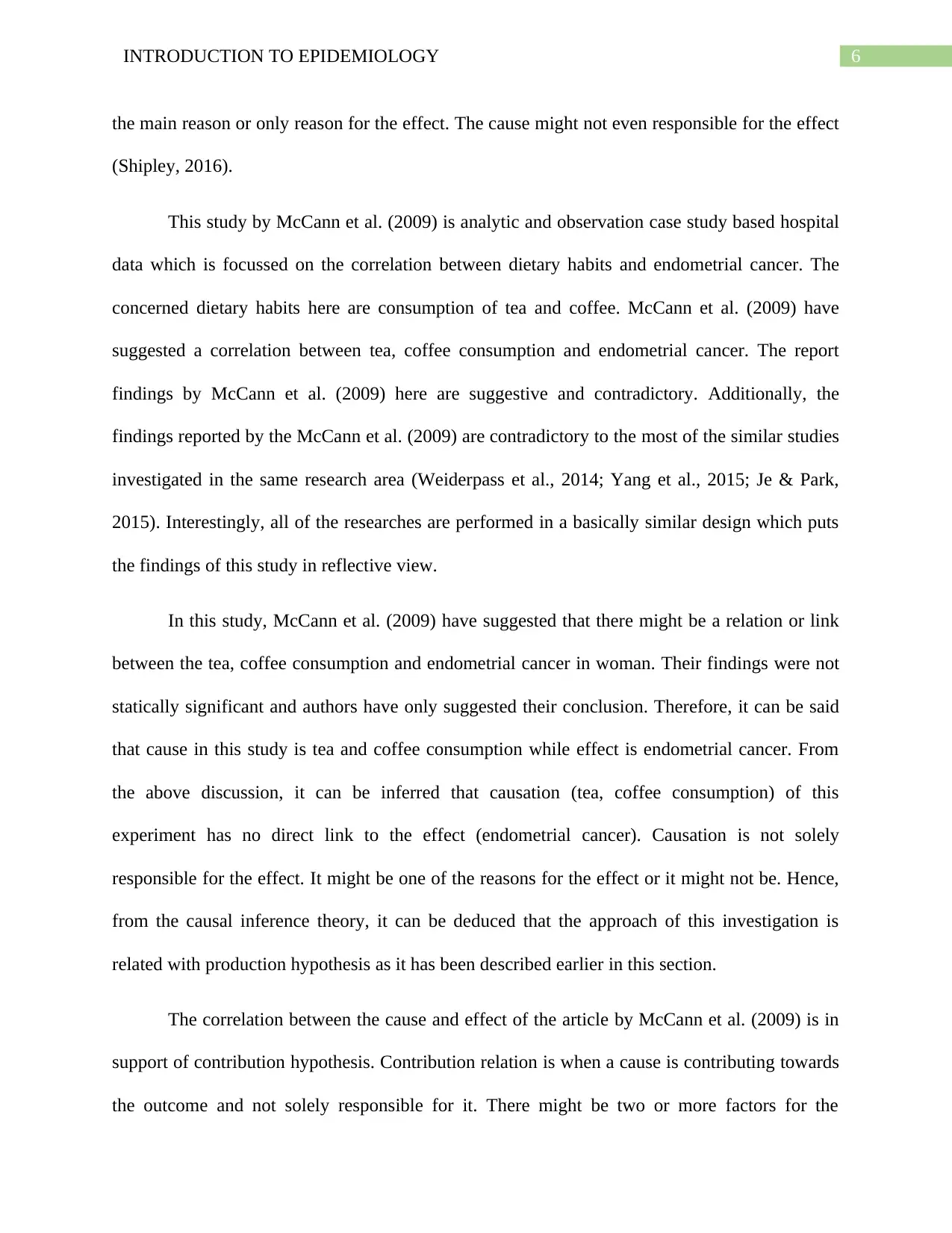
6INTRODUCTION TO EPIDEMIOLOGY
the main reason or only reason for the effect. The cause might not even responsible for the effect
(Shipley, 2016).
This study by McCann et al. (2009) is analytic and observation case study based hospital
data which is focussed on the correlation between dietary habits and endometrial cancer. The
concerned dietary habits here are consumption of tea and coffee. McCann et al. (2009) have
suggested a correlation between tea, coffee consumption and endometrial cancer. The report
findings by McCann et al. (2009) here are suggestive and contradictory. Additionally, the
findings reported by the McCann et al. (2009) are contradictory to the most of the similar studies
investigated in the same research area (Weiderpass et al., 2014; Yang et al., 2015; Je & Park,
2015). Interestingly, all of the researches are performed in a basically similar design which puts
the findings of this study in reflective view.
In this study, McCann et al. (2009) have suggested that there might be a relation or link
between the tea, coffee consumption and endometrial cancer in woman. Their findings were not
statically significant and authors have only suggested their conclusion. Therefore, it can be said
that cause in this study is tea and coffee consumption while effect is endometrial cancer. From
the above discussion, it can be inferred that causation (tea, coffee consumption) of this
experiment has no direct link to the effect (endometrial cancer). Causation is not solely
responsible for the effect. It might be one of the reasons for the effect or it might not be. Hence,
from the causal inference theory, it can be deduced that the approach of this investigation is
related with production hypothesis as it has been described earlier in this section.
The correlation between the cause and effect of the article by McCann et al. (2009) is in
support of contribution hypothesis. Contribution relation is when a cause is contributing towards
the outcome and not solely responsible for it. There might be two or more factors for the
the main reason or only reason for the effect. The cause might not even responsible for the effect
(Shipley, 2016).
This study by McCann et al. (2009) is analytic and observation case study based hospital
data which is focussed on the correlation between dietary habits and endometrial cancer. The
concerned dietary habits here are consumption of tea and coffee. McCann et al. (2009) have
suggested a correlation between tea, coffee consumption and endometrial cancer. The report
findings by McCann et al. (2009) here are suggestive and contradictory. Additionally, the
findings reported by the McCann et al. (2009) are contradictory to the most of the similar studies
investigated in the same research area (Weiderpass et al., 2014; Yang et al., 2015; Je & Park,
2015). Interestingly, all of the researches are performed in a basically similar design which puts
the findings of this study in reflective view.
In this study, McCann et al. (2009) have suggested that there might be a relation or link
between the tea, coffee consumption and endometrial cancer in woman. Their findings were not
statically significant and authors have only suggested their conclusion. Therefore, it can be said
that cause in this study is tea and coffee consumption while effect is endometrial cancer. From
the above discussion, it can be inferred that causation (tea, coffee consumption) of this
experiment has no direct link to the effect (endometrial cancer). Causation is not solely
responsible for the effect. It might be one of the reasons for the effect or it might not be. Hence,
from the causal inference theory, it can be deduced that the approach of this investigation is
related with production hypothesis as it has been described earlier in this section.
The correlation between the cause and effect of the article by McCann et al. (2009) is in
support of contribution hypothesis. Contribution relation is when a cause is contributing towards
the outcome and not solely responsible for it. There might be two or more factors for the
Paraphrase This Document
Need a fresh take? Get an instant paraphrase of this document with our AI Paraphraser
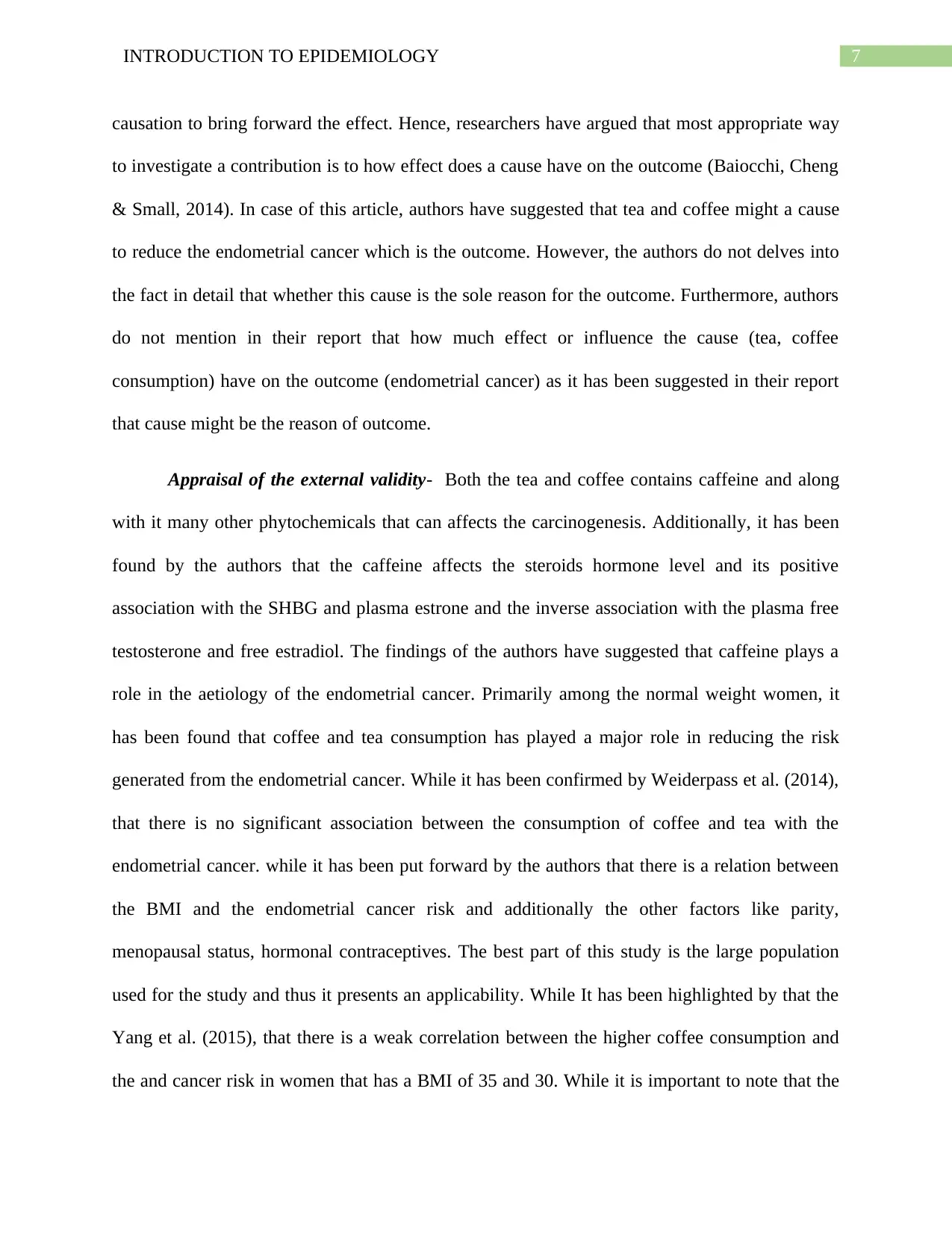
7INTRODUCTION TO EPIDEMIOLOGY
causation to bring forward the effect. Hence, researchers have argued that most appropriate way
to investigate a contribution is to how effect does a cause have on the outcome (Baiocchi, Cheng
& Small, 2014). In case of this article, authors have suggested that tea and coffee might a cause
to reduce the endometrial cancer which is the outcome. However, the authors do not delves into
the fact in detail that whether this cause is the sole reason for the outcome. Furthermore, authors
do not mention in their report that how much effect or influence the cause (tea, coffee
consumption) have on the outcome (endometrial cancer) as it has been suggested in their report
that cause might be the reason of outcome.
Appraisal of the external validity- Both the tea and coffee contains caffeine and along
with it many other phytochemicals that can affects the carcinogenesis. Additionally, it has been
found by the authors that the caffeine affects the steroids hormone level and its positive
association with the SHBG and plasma estrone and the inverse association with the plasma free
testosterone and free estradiol. The findings of the authors have suggested that caffeine plays a
role in the aetiology of the endometrial cancer. Primarily among the normal weight women, it
has been found that coffee and tea consumption has played a major role in reducing the risk
generated from the endometrial cancer. While it has been confirmed by Weiderpass et al. (2014),
that there is no significant association between the consumption of coffee and tea with the
endometrial cancer. while it has been put forward by the authors that there is a relation between
the BMI and the endometrial cancer risk and additionally the other factors like parity,
menopausal status, hormonal contraceptives. The best part of this study is the large population
used for the study and thus it presents an applicability. While It has been highlighted by that the
Yang et al. (2015), that there is a weak correlation between the higher coffee consumption and
the and cancer risk in women that has a BMI of 35 and 30. While it is important to note that the
causation to bring forward the effect. Hence, researchers have argued that most appropriate way
to investigate a contribution is to how effect does a cause have on the outcome (Baiocchi, Cheng
& Small, 2014). In case of this article, authors have suggested that tea and coffee might a cause
to reduce the endometrial cancer which is the outcome. However, the authors do not delves into
the fact in detail that whether this cause is the sole reason for the outcome. Furthermore, authors
do not mention in their report that how much effect or influence the cause (tea, coffee
consumption) have on the outcome (endometrial cancer) as it has been suggested in their report
that cause might be the reason of outcome.
Appraisal of the external validity- Both the tea and coffee contains caffeine and along
with it many other phytochemicals that can affects the carcinogenesis. Additionally, it has been
found by the authors that the caffeine affects the steroids hormone level and its positive
association with the SHBG and plasma estrone and the inverse association with the plasma free
testosterone and free estradiol. The findings of the authors have suggested that caffeine plays a
role in the aetiology of the endometrial cancer. Primarily among the normal weight women, it
has been found that coffee and tea consumption has played a major role in reducing the risk
generated from the endometrial cancer. While it has been confirmed by Weiderpass et al. (2014),
that there is no significant association between the consumption of coffee and tea with the
endometrial cancer. while it has been put forward by the authors that there is a relation between
the BMI and the endometrial cancer risk and additionally the other factors like parity,
menopausal status, hormonal contraceptives. The best part of this study is the large population
used for the study and thus it presents an applicability. While It has been highlighted by that the
Yang et al. (2015), that there is a weak correlation between the higher coffee consumption and
the and cancer risk in women that has a BMI of 35 and 30. While it is important to note that the
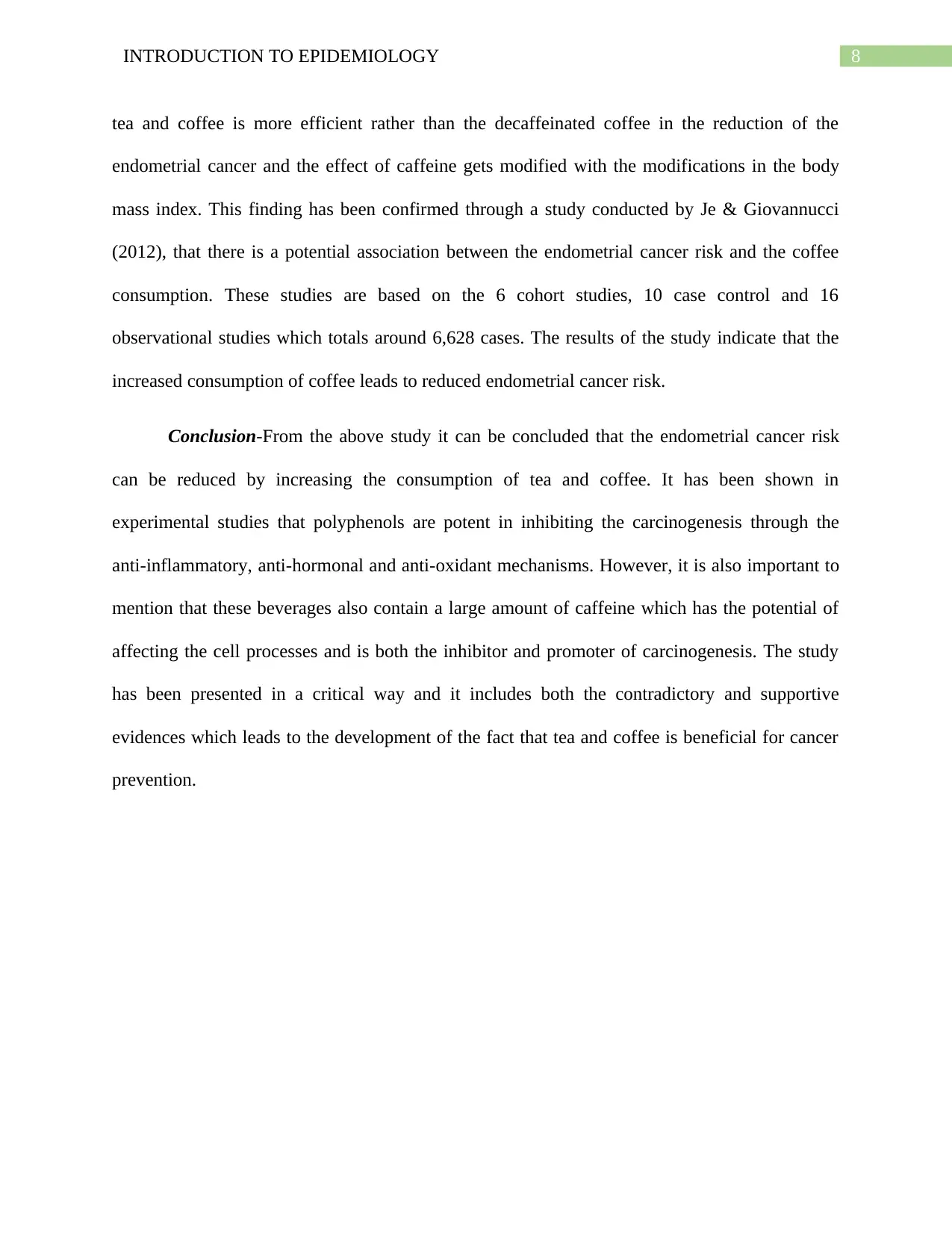
8INTRODUCTION TO EPIDEMIOLOGY
tea and coffee is more efficient rather than the decaffeinated coffee in the reduction of the
endometrial cancer and the effect of caffeine gets modified with the modifications in the body
mass index. This finding has been confirmed through a study conducted by Je & Giovannucci
(2012), that there is a potential association between the endometrial cancer risk and the coffee
consumption. These studies are based on the 6 cohort studies, 10 case control and 16
observational studies which totals around 6,628 cases. The results of the study indicate that the
increased consumption of coffee leads to reduced endometrial cancer risk.
Conclusion-From the above study it can be concluded that the endometrial cancer risk
can be reduced by increasing the consumption of tea and coffee. It has been shown in
experimental studies that polyphenols are potent in inhibiting the carcinogenesis through the
anti-inflammatory, anti-hormonal and anti-oxidant mechanisms. However, it is also important to
mention that these beverages also contain a large amount of caffeine which has the potential of
affecting the cell processes and is both the inhibitor and promoter of carcinogenesis. The study
has been presented in a critical way and it includes both the contradictory and supportive
evidences which leads to the development of the fact that tea and coffee is beneficial for cancer
prevention.
tea and coffee is more efficient rather than the decaffeinated coffee in the reduction of the
endometrial cancer and the effect of caffeine gets modified with the modifications in the body
mass index. This finding has been confirmed through a study conducted by Je & Giovannucci
(2012), that there is a potential association between the endometrial cancer risk and the coffee
consumption. These studies are based on the 6 cohort studies, 10 case control and 16
observational studies which totals around 6,628 cases. The results of the study indicate that the
increased consumption of coffee leads to reduced endometrial cancer risk.
Conclusion-From the above study it can be concluded that the endometrial cancer risk
can be reduced by increasing the consumption of tea and coffee. It has been shown in
experimental studies that polyphenols are potent in inhibiting the carcinogenesis through the
anti-inflammatory, anti-hormonal and anti-oxidant mechanisms. However, it is also important to
mention that these beverages also contain a large amount of caffeine which has the potential of
affecting the cell processes and is both the inhibitor and promoter of carcinogenesis. The study
has been presented in a critical way and it includes both the contradictory and supportive
evidences which leads to the development of the fact that tea and coffee is beneficial for cancer
prevention.
⊘ This is a preview!⊘
Do you want full access?
Subscribe today to unlock all pages.

Trusted by 1+ million students worldwide
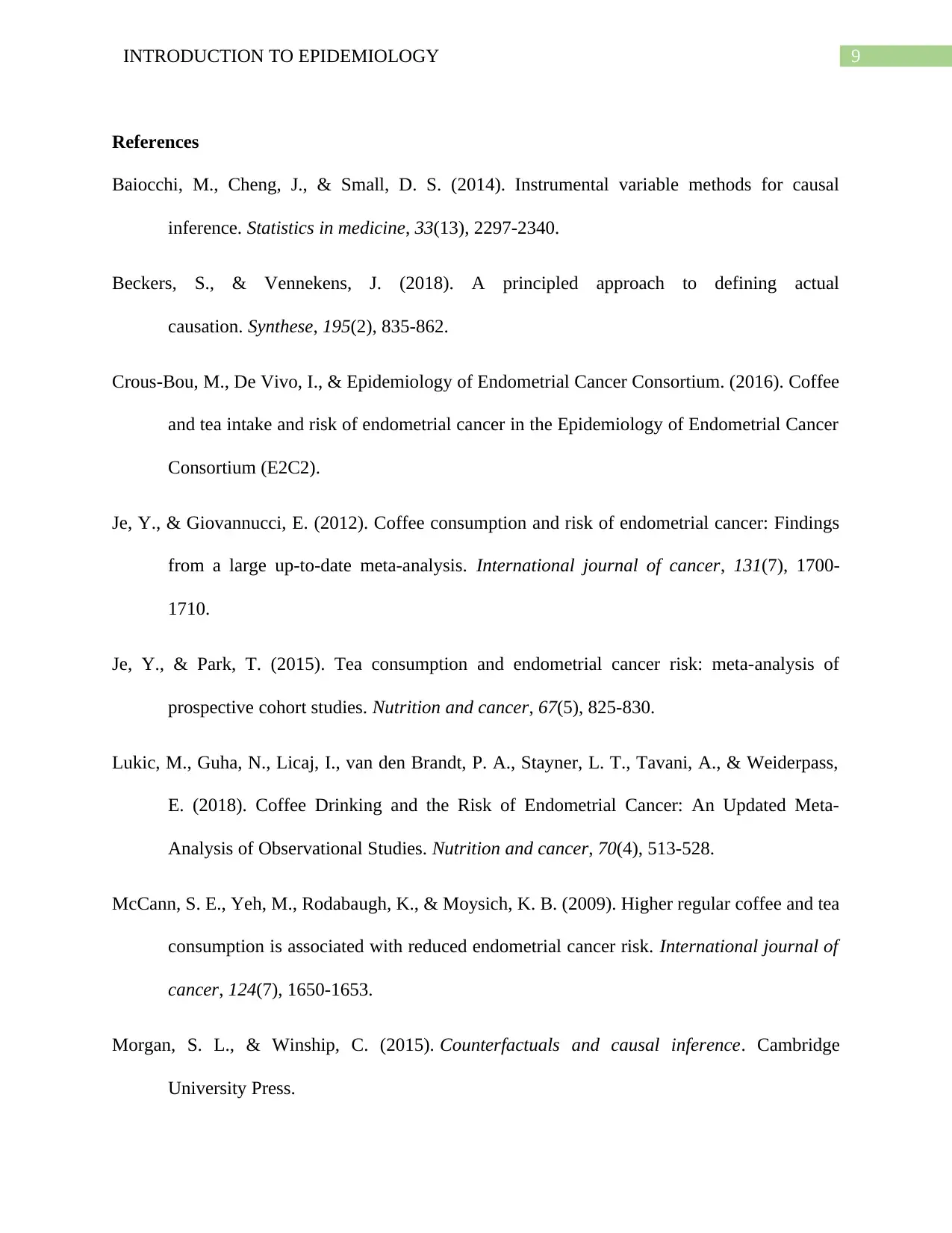
9INTRODUCTION TO EPIDEMIOLOGY
References
Baiocchi, M., Cheng, J., & Small, D. S. (2014). Instrumental variable methods for causal
inference. Statistics in medicine, 33(13), 2297-2340.
Beckers, S., & Vennekens, J. (2018). A principled approach to defining actual
causation. Synthese, 195(2), 835-862.
Crous-Bou, M., De Vivo, I., & Epidemiology of Endometrial Cancer Consortium. (2016). Coffee
and tea intake and risk of endometrial cancer in the Epidemiology of Endometrial Cancer
Consortium (E2C2).
Je, Y., & Giovannucci, E. (2012). Coffee consumption and risk of endometrial cancer: Findings
from a large up‐to‐date meta‐analysis. International journal of cancer, 131(7), 1700-
1710.
Je, Y., & Park, T. (2015). Tea consumption and endometrial cancer risk: meta-analysis of
prospective cohort studies. Nutrition and cancer, 67(5), 825-830.
Lukic, M., Guha, N., Licaj, I., van den Brandt, P. A., Stayner, L. T., Tavani, A., & Weiderpass,
E. (2018). Coffee Drinking and the Risk of Endometrial Cancer: An Updated Meta-
Analysis of Observational Studies. Nutrition and cancer, 70(4), 513-528.
McCann, S. E., Yeh, M., Rodabaugh, K., & Moysich, K. B. (2009). Higher regular coffee and tea
consumption is associated with reduced endometrial cancer risk. International journal of
cancer, 124(7), 1650-1653.
Morgan, S. L., & Winship, C. (2015). Counterfactuals and causal inference. Cambridge
University Press.
References
Baiocchi, M., Cheng, J., & Small, D. S. (2014). Instrumental variable methods for causal
inference. Statistics in medicine, 33(13), 2297-2340.
Beckers, S., & Vennekens, J. (2018). A principled approach to defining actual
causation. Synthese, 195(2), 835-862.
Crous-Bou, M., De Vivo, I., & Epidemiology of Endometrial Cancer Consortium. (2016). Coffee
and tea intake and risk of endometrial cancer in the Epidemiology of Endometrial Cancer
Consortium (E2C2).
Je, Y., & Giovannucci, E. (2012). Coffee consumption and risk of endometrial cancer: Findings
from a large up‐to‐date meta‐analysis. International journal of cancer, 131(7), 1700-
1710.
Je, Y., & Park, T. (2015). Tea consumption and endometrial cancer risk: meta-analysis of
prospective cohort studies. Nutrition and cancer, 67(5), 825-830.
Lukic, M., Guha, N., Licaj, I., van den Brandt, P. A., Stayner, L. T., Tavani, A., & Weiderpass,
E. (2018). Coffee Drinking and the Risk of Endometrial Cancer: An Updated Meta-
Analysis of Observational Studies. Nutrition and cancer, 70(4), 513-528.
McCann, S. E., Yeh, M., Rodabaugh, K., & Moysich, K. B. (2009). Higher regular coffee and tea
consumption is associated with reduced endometrial cancer risk. International journal of
cancer, 124(7), 1650-1653.
Morgan, S. L., & Winship, C. (2015). Counterfactuals and causal inference. Cambridge
University Press.
Paraphrase This Document
Need a fresh take? Get an instant paraphrase of this document with our AI Paraphraser
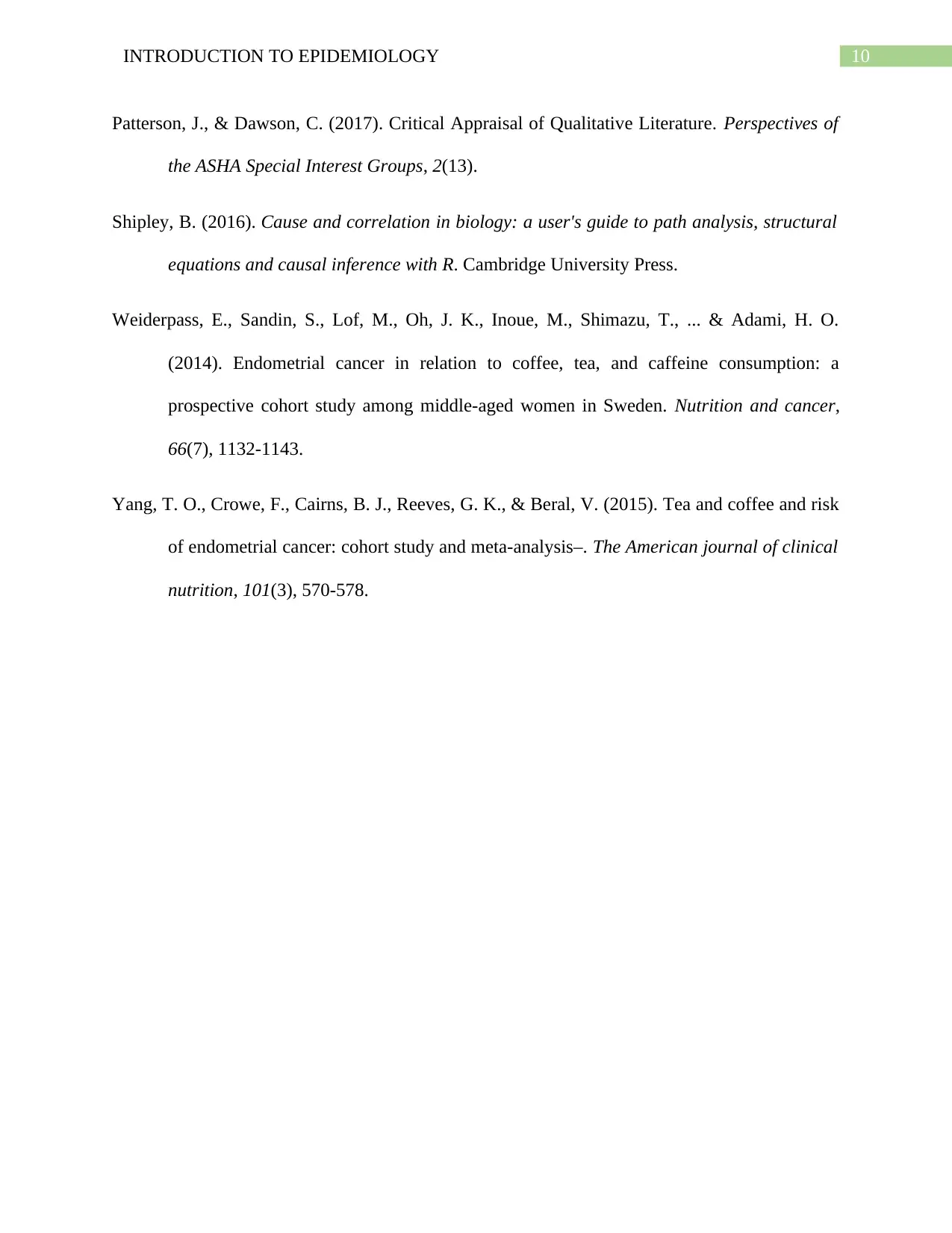
10INTRODUCTION TO EPIDEMIOLOGY
Patterson, J., & Dawson, C. (2017). Critical Appraisal of Qualitative Literature. Perspectives of
the ASHA Special Interest Groups, 2(13).
Shipley, B. (2016). Cause and correlation in biology: a user's guide to path analysis, structural
equations and causal inference with R. Cambridge University Press.
Weiderpass, E., Sandin, S., Lof, M., Oh, J. K., Inoue, M., Shimazu, T., ... & Adami, H. O.
(2014). Endometrial cancer in relation to coffee, tea, and caffeine consumption: a
prospective cohort study among middle-aged women in Sweden. Nutrition and cancer,
66(7), 1132-1143.
Yang, T. O., Crowe, F., Cairns, B. J., Reeves, G. K., & Beral, V. (2015). Tea and coffee and risk
of endometrial cancer: cohort study and meta-analysis–. The American journal of clinical
nutrition, 101(3), 570-578.
Patterson, J., & Dawson, C. (2017). Critical Appraisal of Qualitative Literature. Perspectives of
the ASHA Special Interest Groups, 2(13).
Shipley, B. (2016). Cause and correlation in biology: a user's guide to path analysis, structural
equations and causal inference with R. Cambridge University Press.
Weiderpass, E., Sandin, S., Lof, M., Oh, J. K., Inoue, M., Shimazu, T., ... & Adami, H. O.
(2014). Endometrial cancer in relation to coffee, tea, and caffeine consumption: a
prospective cohort study among middle-aged women in Sweden. Nutrition and cancer,
66(7), 1132-1143.
Yang, T. O., Crowe, F., Cairns, B. J., Reeves, G. K., & Beral, V. (2015). Tea and coffee and risk
of endometrial cancer: cohort study and meta-analysis–. The American journal of clinical
nutrition, 101(3), 570-578.
1 out of 11
Related Documents
Your All-in-One AI-Powered Toolkit for Academic Success.
+13062052269
info@desklib.com
Available 24*7 on WhatsApp / Email
![[object Object]](/_next/static/media/star-bottom.7253800d.svg)
Unlock your academic potential
Copyright © 2020–2026 A2Z Services. All Rights Reserved. Developed and managed by ZUCOL.


